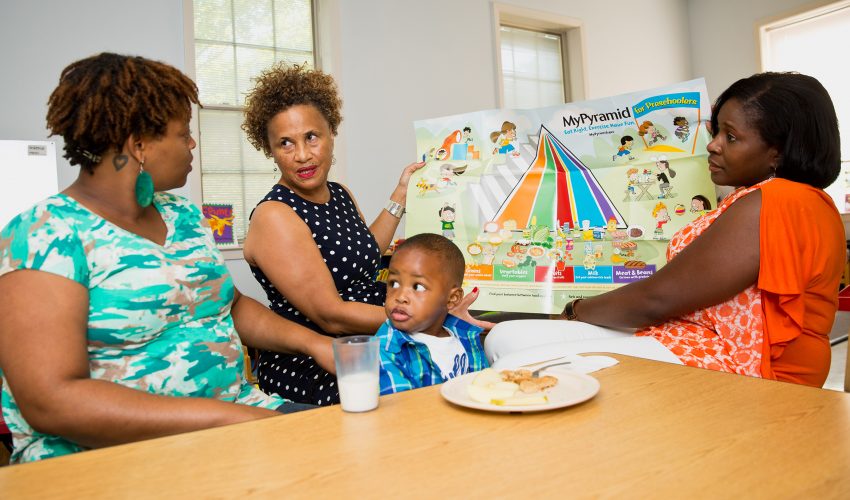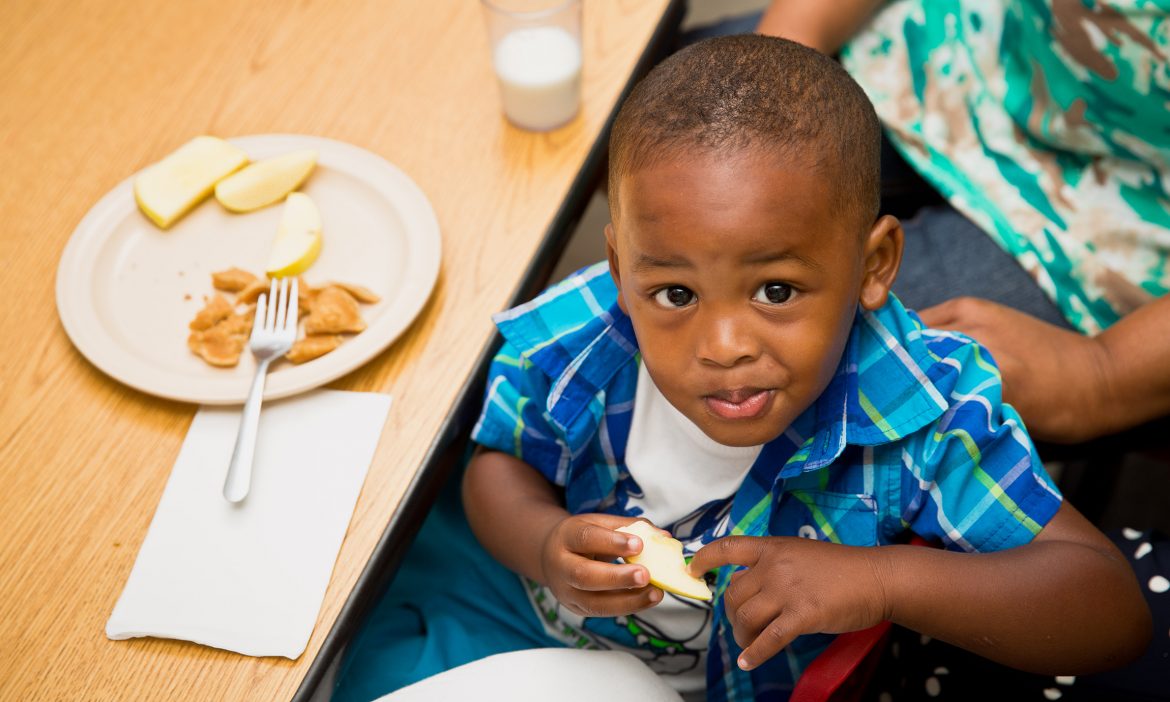Put a plate of vegetables in front of a bunch of 4-year-olds and you know what to expect: Eyes glaze over, bottom lips stick out, and the “but-I-wannas” start about pizza or chicken fingers.
That’s not how things play out at Tanisia Boyd’s family day home in the Frayser community of Memphis.
The children in her care often ask for seconds of green beans and never shy away from a carrot or an apple.
It’s been that way since she started using Porter-Leath Spoonfuls, a program that helps Shelby County’s low-income childcare providers serve well-balanced, nutritious meals to young children in their care.
Serving up the good stuff
Funded by reimbursements from the USDA Child and Adult Care Food Program and run by nonprofit Porter-Leath, Spoonfuls offers:
- Free nutrition training
- Meal planning
- Daily activity calendars and more.
It’s all geared toward getting kids comfortable with and excited about healthy foods.

Tanisia Boyd, Christian and Reneeka Huges, and Loraine Crump
“I’ve taken care of about 70 children since I started helping my mom at our family day home in 2009,” says Boyd.
“With all of them, I just kept thinking:
‘They’re not eating their vegetables, but they need these nutritious foods!’
‘How do I help these kids learn to like them?’”
It is a problem of familiarity but also one of cost: Many families and care providers report that they don’t serve kids vegetables because the kids simply won’t eat them , and the caretakers can’t afford for food to go to waste.
Enter Loraine Crump, program manager at Spoonfuls.


Loraine Crump talks with Reneeka, Christian and Tanisia about the food pyramid.
Crump’s team started by talking with Boyd about the challenges she faced, and then trained Boyd’s staff on how to prepare healthy meals.
Spoonfuls taught portion sizes and nutritional needs by age group and made home visits to ensure sanitary procedures were being followed for food storage, preparation and service.
They even provided free kitchen safety equipment like fire extinguishers and outlet covers.
“Porter-Leath has been our hero — is our hero,” says Boyd.
“We have five hours of training annually, technical support when we need it, and newsletters and resources provided by Spoonfuls to keep us on track.
“We know firsthand how a balanced diet helps kids concentrate better, so Porter-Leath jumped in to guide, support and help us.”

Spoonfuls also ensures sanitary procedures are being followed for food storage, preparation and service.
Picking the right path
Sometimes that support is as simple as listening and finding ways to get the children involved.
“I was driving by the farmers market one day and thought, ‘We should have a field trip,’” says Boyd.
“I told Ms. Crump, ‘I’m certain if I bring my kids here and let them pick any vegetable, it’s going to make a difference.’ Ms. Crump agreed.”
Knowing the vegetables prepared for the meals would be reimbursed by Spoonfuls, Boyd put her plan into action.
She walked her kids through the market, stopping to explain the difference between a snap pea and a cucumber, talking to them about what things taste like.
They got to pick anything they wanted — as long as it was a vegetable.


Spoonfuls offers caregivers creative ideas for getting kids active in addition to providing nutritional information.
It was a natural extension of many Spoonfuls activities that tie school lessons to conversations about food (ex: ‘This is the color green; what foods are green?’).
“They absolutely loved it.
“Since that day, I haven’t had any trouble getting my kids to eat vegetables.”
“In fact, I’ve got about nine vegetable eaters in my house right now!” she says, laughing.
Christian Hughes, age 2, is one of those vegetable eaters.
According to his mom, Reneeka, Christian never stops moving, which means he never stops eating. It’s important to her to know he’s fueling up on the right foods when she’s not around.


Reneeka Hughes feels good about the food Christian eats at Tanisia's house.
“I like the fact that the kids get a nutritious, fulfilling meal when they’re at school,” Hughes says.
“Christian is big on fruits and vegetables, and eating those good foods makes a difference in his concentration and mood. He’s always happy when I drop him off and when I pick him up, so I know he’s getting the food he needs to make him strong, body and brain.”



